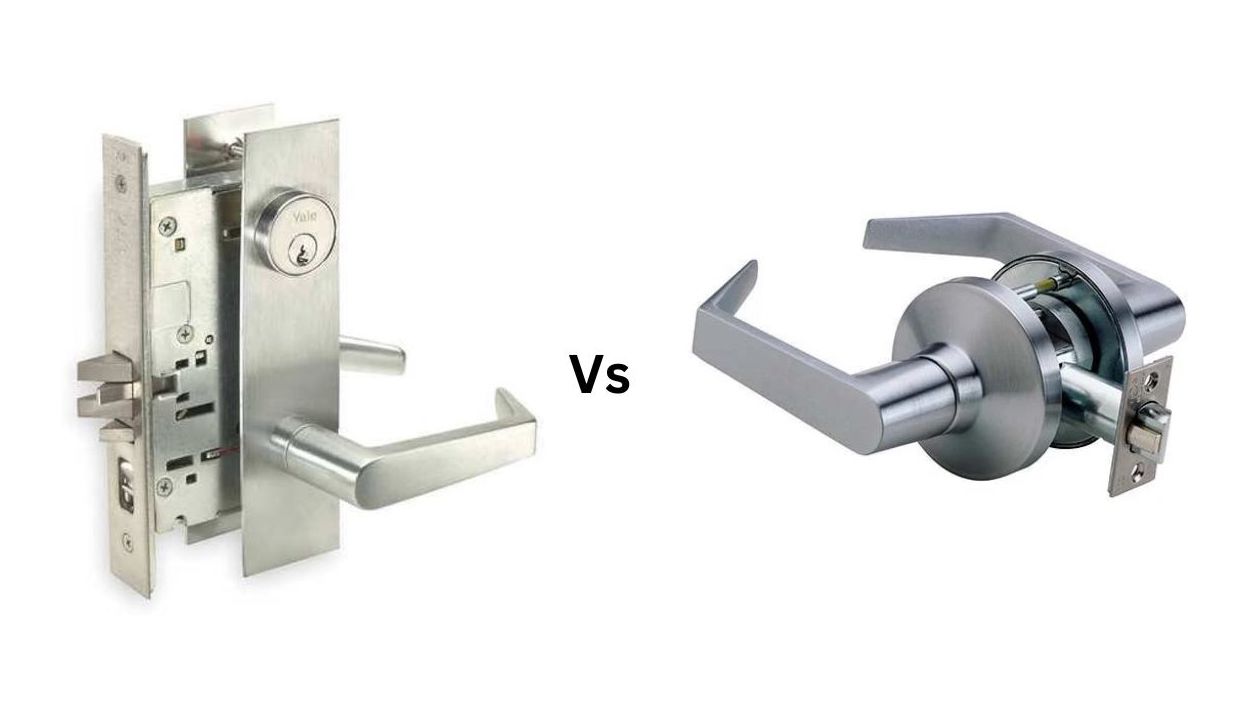When it comes to securing your home or business, understanding the differences between mortise lock and cylindrical lock is crucial. Both types play distinct roles in providing security and convenience. A mortise lock is known for its robust construction and durability, fitting into a specially cut pocket (mortise) within the door. In contrast, a cylindrical lock, also known as a knob or lever lock, is simpler in design, mounted directly into the door with a latch operated by turning the knob or lever.
| Aspect | Mortise lock | Cylindrical lock |
| Security | More secure with robust construction | Less secure, more susceptible to forced entry |
| Durability | Very durable, suitable for heavy use | Durable but less robust than mortise locks |
| Aesthetics | Aesthetically pleasing with visible hardware | Sleeker appearance with minimal hardware visible |
| Application | Common in commercial and high-security settings | Popular in residential and lower-security commercial settings |
| Key Systems | Supports complex master key systems | Limited to basic keying systems |
| Price | Generally more expensive | More affordable compared to mortise locks |

What is mortise lock?
A mortise lock is designed to be installed within a specially crafted recess, or mortise, that is cut into the edge of a door. It typically includes a heavy-duty lock body with a latch operated by a knob or lever inside and a key-operated cylinder outside for locking and unlocking the door. They are known for their security and durability, often used in residential and commercial buildings.
What is cylinderical lock?
A cylindrical lock is a type of door lock that features a cylindrical-shaped mechanism installed through a hole bored into the door. Cylindrical locks are widely used in residential, commercial, and institutional settings due to their durability, convenience, and compatibility with various door types and configurations.
Mortise Lock vs Cylindrical Lock
Security
Mortise Lock: Mortise locks are often constructed using more robust and durable materials, increasing their resistance to physical assaults. Additionally, numerous mortise locks feature multiple locking mechanisms, such as both a deadbolt and a latch, which enhances overall security.
Cylindrical Lock: The security level of cylindrical locks largely depends on their construction and the quality of the materials used. While high-end cylindrical locks can provide significant security, they typically lack the robustness of mortise locks. Moreover, most cylindrical locks have only a single locking point, which is generally less secure compared to the multiple locking points found in mortise locks.
Functions
Mortise Lock: These locks can be adapted to a variety of functions and environments, making them ideal for both commercial use and high-security residential settings.
Cylindrical Lock: Usually equipped with a single locking mechanism, these locks are simpler to use but may provide less security than systems with multiple locking points.
Installation
Mortise Lock: The installation process for mortise locks requires embedding the lock body deeply into the door, offering increased strength and stability. This deep-seated placement secures the lock body within the door, making it more challenging to forcibly remove.
Cylindrical Lock: The installation process for mortise locks requires embedding the lock body deeply into the door, offering increased strength and stability. This deep-seated placement secures the lock body within the door, making it more challenging to forcibly remove.
Aesthetics
Mortise Lock: These locks are available in a diverse array of styles and finishes, which can significantly improve the aesthetic appeal and enhance the overall look of a space
Cylindrical Lock: These locks are available in a diverse array of styles and finishes, which can significantly improve the aesthetic appeal and enhance the overall look of a space
Price
Mortise Locks: Due to their advanced engineering and craftsmanship, mortise door locks typically command a higher price point than other lock types.
Cylindrical Lock: For those prioritizing cost-effectiveness in their lock selection, cylindrical locks present a solid option.mak It is a practical and economical choice for homeowners looking to balance affordability with reliable security solutions
Conclusion
In comparing mortise lock vs cylindrical lock, it becomes evident that each offers distinct advantages depending on security needs and installation preferences.
Ultimately, the choice between mortise locks and cylindrical locks hinges on balancing security requirements, installation convenience, and budget considerations to ensure the best fit for specific security needs and aesthetic preferences.
Frequently Asked Questions
What is the difference between a mortise lock and cylinder lock ?
A mortise lock is installed within a door’s pocket (mortise), offering robust security with multiple locking points like deadbolts and latches. In contrast, a cylinder lock fits into a pre-drilled hole in the door, featuring a simpler design with a single locking mechanism, suitable for residential and light commercial use.
What are the disadvantages of a mortise lock ?
Mortise locks are more expensive than other locks.
What are the disadvantages of a cylinder lock?
Cylinder locks are not that sturdy therefore security may be compromised.
How can you tell if a lock is mortise?
You can tell if a lock is mortise by checking if it requires a deep pocket (mortise) cut into the door for installation.


